Israel Prize-winning educator Miriam Peretz, who lost 2 sons in battle, vies to become country’s first woman president, while Isaac Herzog aims to follow in his father’s footsteps
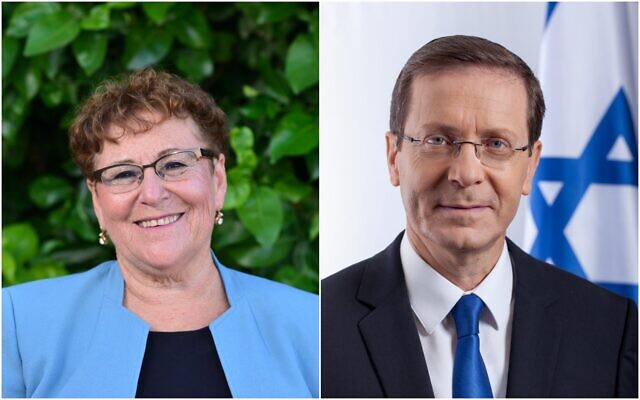
Israel’s 120 members of Knesset will vote Wednesday for the country’s next president, in a race that pits Isaac Herzog, possibly the closest thing Israel has to royalty, against Miriam Peretz, a Moroccan-born woman who overcame the loss of two of her sons in battle to become an Israel Prize-winning educator.
Whoever is elected will replace the popular President Reuven Rivlin, whose seven-year term ends on July 9.
Herzog, 60 — the Jewish Agency chairman, a former head of the Labor party, the son of Israel’s sixth president, Chaim Herzog, and the grandson of Israel’s first chief rabbi, after whom he was named — is seen as the frontrunner. However, the secret nature of the voting process could well leave an opening for Peretz to become the first woman ever elected to the position.
“I think that would be a great miracle,” Peretz, 67, told Channel 13 in an interview conducted as a reporter followed her around the Knesset while she campaigned among legislators.
The Tuesday broadcast highlighted the stark contrast between Peretz, who warmly hugged and posed for pictures with parliamentary staffers, and Herzog, a veteran politician with widespread connections, but little charisma.
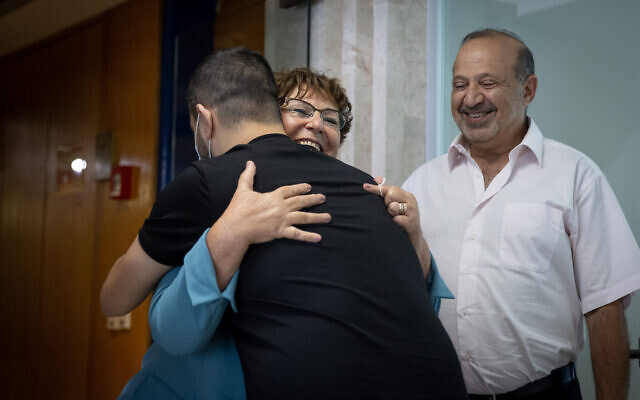
“Look at me,” said Peretz. “A woman who came from Morocco, from the Atlas Mountains, with parents who could not read or write.”
“Did anyone think a girl like me, who grew up in an immigrant camp in Beersheba, who cleaned houses until she was 20 to be able to buy a refrigerator for her parents, would be here now?” she asked, adding that she drew her strength from the people of the country.
Peretz became a household name under the most tragic of circumstances after her eldest son Uriel was killed fighting in Lebanon in 1998 and his younger brother Eliraz was killed in an operation near Gaza in 2010. But the Casablanca native went on to become a motivational speaker on issues surrounding Zionism and coping with loss. In 2018, she won the Israel Prize for lifetime achievement, the country’s highest cultural honor.
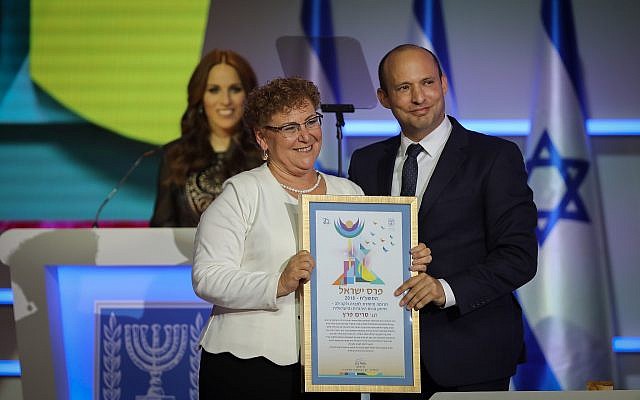
In 2019, several political parties courted Peretz to join them ahead of the first of four elections held in the past two years. The interested slates included New Right, Kulanu, and Yesh Atid — parties from the right, center-right and center. Peretz turned down the offers, explaining that she wanted to continue her public work outside the framework of politics, where she believed she’d have greater influence.
While Peretz is seen as a popular and unifying figure, the bulk of her support will likely come from the right given her ties to the national religious camp and the fact that she’s running against a former chairman of the left-wing Labor party.
Peretz would be the first woman elected president, but she would not be first woman to serve in the position. In 2007, then-Knesset speaker Dalia Itzik served as acting president for several months following the resignation of Moshe Katsav over rape allegations for which he was ultimately convicted.
Herzog, on the other hand, appeared to be relying on his extensive personal relations with lawmakers across the political spectrum, most of whom refer to him by his childhood nickname, “Bougie.”
In securing the 10 signatures from lawmakers he needed to enter the race, he obtained signatures from Likud MKs Gadi Yevarkan and Keti Shitrit; United Torah Judaism MKs Yaakov Asher, Yitzhak Pindrus and Ya’akov Tessler; Religious Zionism MK Simcha Rotman; Yamina MKs Idit Silman and Abir Kara; Yesh Atid MK Merav Ben Ari; Yisrael Beytenu MKs Oded Forer and Hamad Amar; and Labor MKs Omer Barlev, Efrat Rayten and Ram Shefa.
Herzog filed with 27 signatures, and Peretz filed with just11.
“It’s a campaign like any other campaign,” he told Channel 13.
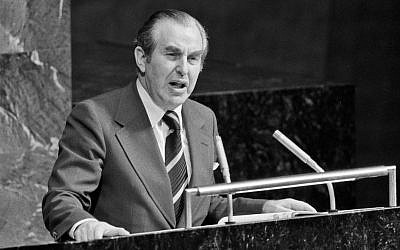
“The Knesset will decide who will be the president and I respect the members of Knesset. I see them again and again and speak to them about everything,” said Herzog, who also made a trip to the Western Wall on the day before the vote.
“My personal family history and years-long public experience have taught me to never take the miracle of the existence of the State of Israel for granted,” he said in announcing his candidacy, highlighting the need to heal and unite the nation following the then-ongoing Gaza fighting and the extended political crisis, as well as the need to strengthen ties with world Jewry.
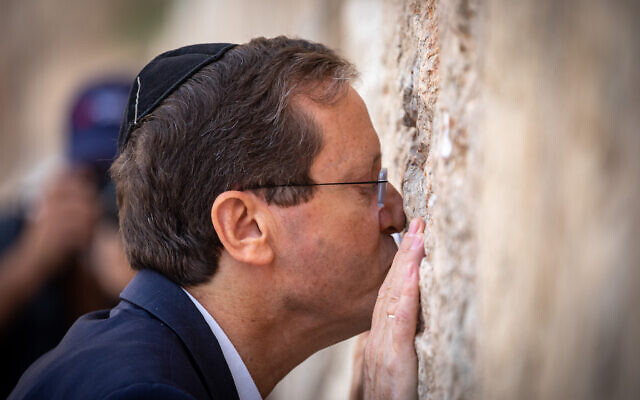
Israel’s president is largely ceremonial but plays a key role in deciding who gets the mandate to form a government following elections. The president also has the power to pardon people and grant clemency, something that could become a key issue should Prime Minister Benjamin Netanyahu be convicted in his corruption trial.
Both candidates refused to say whether they would consider pardoning Netanyahu and Peretz said the issue had not come up during her talks with MKs.
Netanyahu has not endorsed either candidate.
Perhaps highlighting the difficulties Peretz will have, Shelly Yachimovich, another former Labor party leader, Herzog rival, social and feminist activist, tweeted that she nevertheless supports Herzog.
“If I was still an MK, I would vote for Isaac Herzog,” she tweeted. “He is a rich, white, privileged man (who called me a bitch,) and I prefer a Mizrahi woman. But… Peretz is appreciated and impressive, and we identify with her grief, but we sanctify life, and to choose someone due to loss would be a step too far.”
“Bougie is simply suited,” she wrote. “In a conventional way, not a revolutionary one.”
As reported by The Times of Israel
